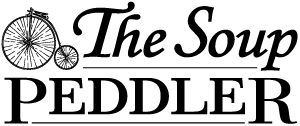Soup of the Weird

As November rolls on, the nation's mind turns to the important business of elections (that's your subtle reminder to vote on Tuesday), and our collective stomach sets its attention towards things more soupy... my Google Soup News Alert has been nearly shaking my laptop off the desk with its heightened frequency, an indication of our heartier propensity for soup this time of year. No, that is not a segue, as usually employed, for me to share international stories of poisoned soups, intra-office disgruntled hot soup attacks, etc., but rather to explain my refreshed obsession with soup research. I would like to share with you some soup-related findings from the Library of Congress. Indeed, I am writing to you from my hometown of Baltimore, just up the street from the current home of a former governor of Texas... my visit to the main reading room of the Library was a stunning experience. The susurrations of the page-turning researchers, bouncing off the cavernous walls and vaulted ceilings... the sepia tone of the lighting, dotted with little green reading lamps... all this makes one feel like they are in a cathedral of learning, a holy place of information, a feeling that, no matter how voluminous their indexes, the search engines of the internet could never replace. My discoveries this week are neither mind-blowing nor life-changing, just a little nod to the place of soup in the history of our great nation. Here are some of my findings, ranging from mildly interesting to vaguely stimulating...
We begin with some findings from the WPA Life Histories Project... a most charming transcription of an Italian immigrant's story of saving his neighbor with love and a pot of soup. Next up is a fascinating, if slightly off-color dictionary of cafeteria jargon from a bygone wharf culture. We continue with something from the sheet music collection, the Soup House Waltz, which I'll take a turn with at the piano tonight. Here's a description, and pay attention Soup Peddler Soupmakers, of working conditions at Chicago's Armour Meatpacking plant, circa the time of Upton Sinclair's 'The Jungle'. I unearthed this etymology of the word 'doughboy' and its relationship to soup. Look under the heading 'The Prize Solution'.
Let's move on to some photographic interest, as I sense your attention wavering ever so slightly from all the text-heavy reference... look here and here and here and here for some photos of convicts and hoboes and general working poor with soup. We have previously touched on the importance of soup in the lives of the military... look here and here and here and hereand here and here for some action shots and the common use of soup as a metaphor for military operations.
Soup has been an important image in race relations... look here and here.
And finally, our founding father George Washington used a rather strongly worded soup metaphor in a letter to his pal and Lieutenant General Rochambeau here and our great Pa Bell, Alexander Graham, that is, was known to quaff soup often; here is a journal entry listing mulligatawny as a favorite. In letters between he and his wife, soup was mentioned no less than fifteen times over the course of their correspondence.
